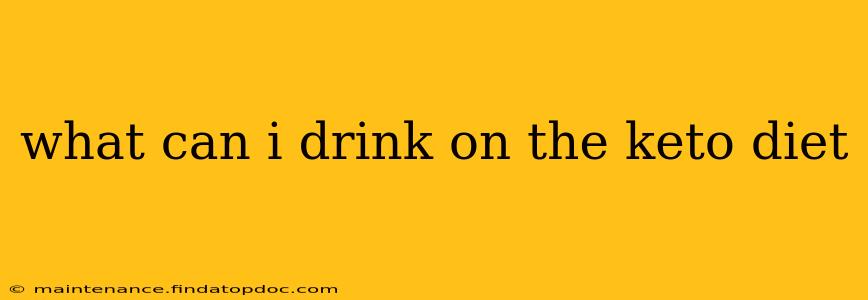Embarking on the ketogenic diet often involves a significant shift in dietary habits, and that includes your beverage choices. While many sugary drinks are off-limits, there's a wide array of delicious and hydrating options perfectly compatible with your keto lifestyle. This guide explores the best and worst drinks for keto, helping you stay hydrated and satisfied while sticking to your macros.
What are the best keto drinks?
The best keto drinks are those that are low in carbohydrates and calories, while ideally offering some added benefits like electrolytes or antioxidants. Here are some top contenders:
-
Water: The undisputed king of keto hydration. Plain water is calorie-free, carb-free, and essential for overall health. Aim for at least half your body weight in ounces daily.
-
Unsweetened Tea (black, green, white): These teas provide antioxidants and can be enjoyed hot or iced. Avoid sugary versions or those with added syrups.
-
Coffee (black or with unsweetened cream/milk): A keto staple for many, coffee offers a caffeine boost without impacting your macros significantly. Use caution with added creamers as some contain added sugars. Unsweetened almond milk or heavy cream are suitable alternatives.
-
Bone Broth: This nutrient-rich broth is packed with collagen, electrolytes, and minerals, offering a savory and satisfying alternative to other drinks.
-
Sparkling Water: A refreshing option to curb cravings for sugary sodas. Look for unsweetened varieties. You can add a squeeze of lemon or lime for extra flavor.
-
Electrolyte Drinks (sugar-free): These can be particularly beneficial during keto adaptation, helping to replenish electrolytes lost through fluid shifts. Check labels carefully to ensure they are sugar-free and low in carbs.
What drinks should I avoid on keto?
The keto diet restricts carbohydrates, meaning many popular beverages are off-limits. These are some drinks to avoid:
-
Sugary Sodas: Loaded with sugar and carbs, these are a major no-no on keto.
-
Juice (even fruit juice): Fruits contain natural sugars, making juices high in carbs and unsuitable for keto.
-
Sweetened Tea/Coffee: Added sugar negates the benefits of these otherwise keto-friendly beverages.
-
Alcohol (most types): Many alcoholic drinks contain significant amounts of sugar and carbohydrates. Dry wine (in moderation) and certain spirits mixed with unsweetened alternatives (like sparkling water or diet tonic) can be consumed sparingly, but always in moderation and mindful of carb counts.
-
Sports Drinks: Many sports drinks are high in sugar. Opt for electrolyte-enhanced water instead.
What about low-carb protein shakes?
Low-carb protein shakes can be a helpful addition to a keto diet, particularly for those aiming to increase protein intake. However, it's crucial to carefully read nutrition labels. Choose protein powders that are low in carbohydrates and sugar. Whey protein, casein protein, and collagen protein are usually good options. Remember to mix them with keto-friendly liquids like water or unsweetened almond milk.
Are there any keto-friendly alcoholic beverages?
Yes, but with caveats. Some spirits, like vodka, gin, tequila, and whiskey, are relatively low in carbs when consumed neat or with diet mixers. However, always be mindful of your daily carbohydrate limit and drink responsibly. Dry wine (in moderation) is another potential option. Avoid sugary cocktails and mixed drinks.
Can I drink diet soda on keto?
While diet sodas are generally carb-free, some people find they can trigger cravings or negatively impact their gut health. While not strictly forbidden, it's best to limit or avoid them entirely and focus on water, unsweetened tea, or other healthier choices.
Does drinking enough water help with keto flu?
Yes, staying well-hydrated is crucial, especially during the initial stages of keto adaptation (keto flu). The keto flu is characterized by headaches, fatigue, and nausea, often caused by electrolyte imbalances from fluid shifts. Drinking plenty of water and supplementing with electrolytes can help alleviate these symptoms.
By carefully considering your beverage choices, you can ensure your hydration and nutritional needs are met while successfully navigating the ketogenic diet. Remember to consult with a healthcare professional or registered dietitian before starting any new diet, especially if you have underlying health conditions.
